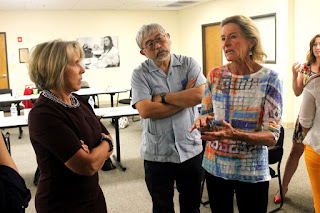 |
| Photo: Ellen Buelow |
Even when it appears we are not making a difference, we really are." Rep. Michelle Lujan GrishamMany legislators who sit on the House or Senate Agriculture Committee or on a committee that has decision-making powers on agriculture are holding listening sessions with constituents ahead of the upcoming debate on the next Farm Bill. The chairs of the House and Senate Agriculture Committees have set a goal of completing the legislation on time this year, before the current law expires in September of 2018.
Because of delays and disagreements, the 2012 Farm Bill was not approved until 2014. The Agricultural Act of 2014, reduced funding for the Supplemental Nutrition Food Assistance Program (SNAP) by about 8.6 billion over 10 years.
"The good news is we starting work early on this farm bill, Rep. Michelle Lujan Grisham told more than a dozen persons invited to dialogue on the next five-year agriculture legislative initiative.
The congresswoman said the early discussions are allowing members to reach agreements on the framework of the new legislation. "This is the most bipartisan effort in Congress," said Lujan Grisham.
 |
| Lujan Grisham poses with Anti-Hunger & Nutrition Advocates (Photo Stephanie Kean) |
Some of the advocates asked that funding for the nutrition education elements of SNAP not only be protected but improved."We need education programs tailored to education levels of recipients," said Patty Keane, immediate past-president of the New Mexico Academy of Nutrition and Dietetics (NMAND) and associate scientist, nutrition Lecturer II, Department of Pediatrics Prevention Research Center.
Honored to participate in this #FarmBill listening session w/ @RepLujanGrisham, the wonderful #TeamMLG & this amazing group. #SNAP #SNAPEd https://t.co/YHduWic29y— Patty Keane, MS, RD (@PKeaneRD) August 19, 2017
Pam Roy, executive director of Farm to Table, spoke about the need to add language to the Farm Bill that takes into account cultural factors when implementing nutrition programs locally. "We need to include culturally significant foods on Indian reservations," said Roy, who is also director of the New Mexico Food and Agriculture Policy Council.
 |
| Photo: Carlos Navarro |
There was also request to resist deep cuts in SNAP. Melody Wattenbarger, CEO of Roadrunner Food Bank, said her Albuquerque-based food bank (which reaches out into many parts of New Mexico) and all the food banks in the Feeding America network, view SNAP as a very important program in the overall effort to address hunger in the United States. "The SNAP program provides 10 times more food than our combined (Feeding America) network," Wattenbarger
Bread for the World advocates also asked that the next farm bill protect funding and the structure of SNAP, including not making food stamps a program that is block-granted. "I'm going to work to prevent block grants," Rep. Lujan Grisham reassured us.
 |
| Photo: Stephanie Kean |
Within the conversation on obstacles, there was a mention of finding ways to get around the cliff effect, when a person who receives SNAP benefits (usually a working mother) receives a promotion that renders her ineligible for food stamps.
Congress will return to work after Labor Day, which means that work of the formal work on the Farm Bill will resume at that time. Rep. Lujan Grisham urges constituents to keep sending her comments. Use this link to contact the congresswoman.
No comments:
Post a Comment